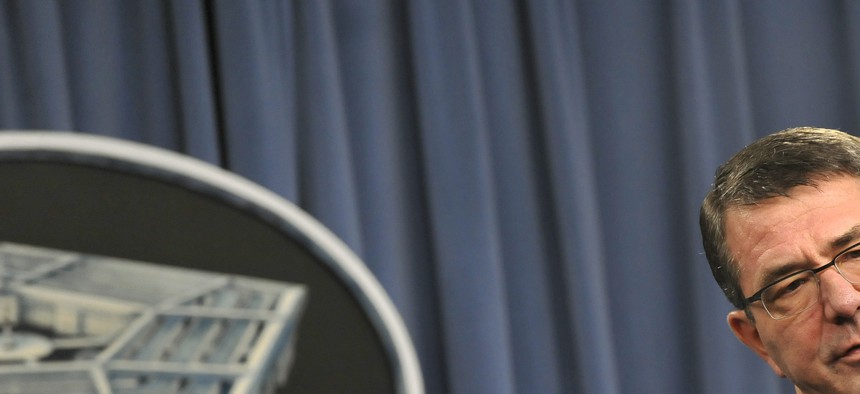
Defense Department file photo
The Many Trials Ahead for Ashton Carter at the Pentagon
The next defense secretary will inherit "no shortage of challenges to our national security," President Obama said in his nomination.
Ashton Carter's stewardship of the Pentagon may only last for the final two years of the Obama presidency, but the veteran of Washington's national security establishment won't have the luxury of being a caretaker defense secretary.
"We face no shortage of challenges to our national security," President Obama said while formally nominating Carter in a White House ceremony on Friday. As if they needed repeating, the president went on to list the growing number of headaches the 60-year-old physicist will inherit upon his likely confirmation by the Republican-controlled Senate early next year.
And as Obama reminded him in multiple ways on Friday, he'll have to do all of that with a budget designed for peacetime. "Going forward, our armed forces are necessarily going to be leaner," the president said. He added that the administration would have to "work with Congress on a more responsible approach to defense spending," and he lauded Carter as "a reformer who's never been afraid to cancel" old or outdated defense systems. Carter, who served as the Defense Department's second-ranking official earlier in Obama's tenure, will have to preside over the end of the U.S. combat mission in Afghanistan while managing another war against the Islamic State in Iraq and Syria. He'll have to keep a wary eye on Vladimir Putin's land-grabbing while building up the nation's cyber-defenses against the snooping of China, Russia, and other would-be hackers. Carter must fight a medical war as well, with thousands of U.S. troops heading to West Africa to combat the Ebola outbreak.
The Republican hawks about to reclaim power in Congress want little part of that strategy, and while the new Senate majority probably will confirm Carter without too much of the usual drama, GOP pooh-bahs like John McCain were already downplaying the influence he'll have in an administration that centralizes decision-making in the White House. "I'm sure that he's been around long enough to know that he will have little to no voice in the crucial decisions on national security," McCain scoffed on Tuesday.
For his part, Carter tried to make clear, respectfully, that he wouldn't be a mere yes-man. "If confirmed in this job, I pledge to you my most candid strategic advice," he said, turning slightly as if to make sure his new boss was paying attention. The outgoing defense secretary, Chuck Hagel, who was pushed out rather unceremoniously, was a notable absence at the White House on Friday. A defense official, speaking anonymously to the pool reporter, said Hagel "believes strongly that this day belongs to Ash Carter" and "does not want in any way to detract from or distract the proper focus of the day." Hagel released a gracious written statement praising Carter after the event concluded.
While Carter was a top contender for the job from the moment Hagel resigned, a number of other potential candidates, including Michele Flournoy, made clear they didn't want the nomination. After having left the Defense Department just over a year ago, Carter said he accepted Obama's offer to return for several reasons, including his respect for the president's leadership, "the seriousness of the strategic challenges that we face," and his abiding commitment to U.S. service-members. The president went with a lighter note. "I think it's fair to say, Ash, that at your one-year attempt at retirement from public service, you failed miserably," Obama said to laughs. "But I am deeply grateful that you’re willing to go back at it."






